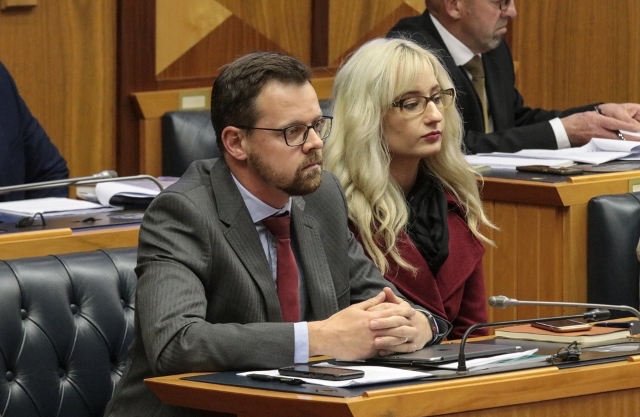- home Home
- keyboard_arrow_right CURRENT AFFAIRS
- keyboard_arrow_right Posts
- keyboard_arrow_rightIn AfriForum’s self-immolation, lies acute warnings for Lesetja Kganyago
In AfriForum’s self-immolation, lies acute warnings for Lesetja Kganyago
By Khaya S Sithole
Last week, during the Parliamentary leg of the public hearings into the uncompensated land expropriation debate, Ernst Roets of AfriForum mercilessly dragged his organisation and his entire constituency into the most bizarre act of self-immolation in modern times.
As the most vocal and well-resourced opponents to the idea uncompensated expropriation, AfriForum has made its presence felt at all the public hearings across the country; they have made countless written submissions indicating their opposition to the idea; and to top it up, also exercised their right to present to the Constitutional Review Committee in Parliament.
The expectation some of us had with the oral presentation was that it would indeed reiterate AfriForum’s stance but also take cognisance of the fact that the hearings across the country have overwhelmingly highlighted the desperate levels of land hunger across multiple communities and constituencies. In taking cognisance of the prevailing sentiment across the country, the logical thing for AfriForum would have been to explicitly acknowledge what they have heard in all the other hearings where they have been so visibly represented; and then move on to articulate why they believe their position still stands.
Regrettably, in his approach that mixed historic revisionism, volleys of insults and downright intransigence, Ernst Roets managed to alienate and unite in equal measure. In his refusal to read the mood of the country and the committee itself, Roets alienated himself and his constituency from the consultative nature of the debate. Through his insults and lack of empathy – historical and otherwise – Roets managed to unite different political parties in sharing their disgust at the tone of his presentation. As the DA’s Glynis Breytebach observed, it was a missed opportunity.
Whilst AfriForum mastered the art of being tone-deaf, the politicians have no such luxury ahead of a general election and will have to propose what is in line with what they have heard at the public hearings.
Consequently, it is now inevitable that the Committee will recommend an amendment to section 25. In spite of this, Afriforum declined to offer insights into how such as process could be conducted in a manner that favors or protects their own constituency. Given the voting power controlled by the ANC and the EFF, any constitutional amendment in the current parliament that they both support will be passed. The real conversation should now move to the question of what the amendment ought to look like and the related consequences.
READ: Amendment of Constitution necessary for Land Expropriation- Ramaphosa
Admittedly, given the complexities involved it will take time to finalise the land process. But one does not need to wait for the land issue to be finalised in order to watch the impact of expropriation under section 25 in play. Last month, Julius Malema tabled the Bank Amendment Bill with the call for the nationalisation of the Reserve Bank. The key point of contention – what to do with the current private shareholders – was simply bypassed in the Malema proposal.
The inference, therefore, is that by simply writing them out of existence and placing all shares in the custody of the Minister of Finance and stating that there are no financial consequences associated with the bill, Malema is advocating for the uncompensated expropriation of such shares. For this to happen, Parliament will indeed have to invoke section 25.
If this is to happen with no compensation on offer, Parliament would indeed have to survive the hurdles of sections 25(1) and 25(2). Should the shareholders be dispossessed of their 2 million shares it will fall within the ambit of ‘deprivation of property’ as envisaged in 25(1). However, deprivation is permitted if it is conducted in terms of the law of general application. The prohibited part is arbitrary deprivation.
Consequently, what would be the key question is whether depriving the shareholders of their current shareholding and passing it on to the Minister for no compensation amounts to arbitrary deprivation or not. To this end, the stakeholders in this debate need to apply their minds to this before proceeding. If the view is that such deprivation is in the public interest for example, then that ought to be sufficient to distinguish between legitimate deprivation and arbitrary deprivation. And should the process be regarded as legitimate deprivation due to it being in the public interest for example, then the expropriation can be effected subject to compensation.
Section 25(2)(b) – the compensation clause – envisages 3 possibilities: mutual consent; court sanctioned or court-approved compensation. Given the fact that some shareholders in the bank feel entitled to a subdivision all of its reserves, Kganyago will definitely not reach a consensus on the value with the shareholders.
Consequently, since no value will be put on the table by the shareholders and the governor for a court to approve; it leaves the option of the courts making a decision on the valuation as the only possibility. In this case, we may end up with a test case of how the compensation clause should be applied long before we finalise the land expropriation conversation. In an ideal world, such a legal case would articulate the legally-acceptable basis on which zero compensation is warranted, even if the Reserve Bank shareholders are still awarded some compensation.
This will provide a legal precedent that will go some way to providing some clarity for the land question. Such clarity is what some academics and researchers – myself included, have identified as the missing piece of the puzzle. This is the one way that the Malema proposition – expropriating the shares with no compensation – can currently be pursued.
In the alternative where the politicians decide that the shareholders are due some compensation, the question of what amounts to just and equitable compensation will still be disputed by the shareholders and the court process is equally inevitable. The reality, of course, is that the Malema amendment would be significantly bolstered if it were accompanied by a proposal to amend section 25(2) so that it says ‘AND MAY BE subject to compensation’ rather than ‘AND subject to compensation’. Amending section 25 to put the speculative rather than the definitive term will make it clear that compensation is not guaranteed but will depend on particular circumstances.
The key point to remember is that section 25 is not actually a land clause but a property clause with land being viewed as a form of property. On that note it would be ill-advised to structure the entire section based on a land question as other forms of property clearly do not share the same issues of contention as land in South Africa. I am not particularly sure how this was missed by the EFF as it would have given them a dual arsenal on the section 25 amendment conversation – using the land issue and the bank issue to bolster their case of Constitutional amendments.
READ: Subsistence farming: Start with a vegetable garden before asking for land
The governor of the bank – Lesetja Kganyago – has repeatedly stated that not only is the transfer of shares an exercise in cosmetics, but also the fact that the shareholders feel legitimately entitled to some compensation. The sad reality, however, is that this conversation has long left the warehouse of intellectual rationalisation and become as political a process as the land debate. In other words, the Bank Amendment Bill will indeed come to pass. What becomes important for the governor from now on, is to enter into a reluctant embrace of the process and seek it to influence its direction instead. To this end, an approach similar to Ernst Roets would be catastrophic for Kganyago as we all know that once the EFF position and the Nasrec resolutions converged, nationalisation of the Reserve Bank became inevitable.
Given the polarised nature of our politics, any hostility towards the governor and the bank will simply mean that after nationalisation, the very mandate of the bank will be under siege. And with an election looming – Kganyago and the rest of us must stop pretending that we can still rationalise and intellectualise our way through a conversation that has long escaped the confines of reason.
#AsYouWere
Written by: Zuko
Similar posts
MORE ARTICLES

In Pictures: Mzansi Celebs serve style and drama at Durban July 2025

Five killed in KZN crash allegedly caused by Polo driver

From Benin to the world: Kidjo makes history as first black African on Hollywood Walk of Fame

Drama, cheating and Surprise guest: RHOD reunion delivers shocking revelations

Why Waterfall Estate’s 99-year lease is practically forever
QUICK LINKS
UpComing Shows

Touch of Soul
With T Bose
Kaya 959 takes back Sundays with A Touch of Soul, the only show bringing you soul and RnB music that touches your mind, body and spirit. The Best T in the City, T-bose takes you back to a time when music was made to last. A Touch of Soul is the perfect wind-down to your weekend. Sundays 14h00 to 18h00.
close
The Jazz Standard
with Brenda Sisane
The Jazz Standard with Brenda Sisane. Sunday's 12:00-15:00.
close
Spade of Hearts
With Xola Dlwati
WITH XOLA DLWATI: SATURDAYS 12:00 -15:00 Spade of Hearts is a fuse of love and soulful sounds, pulling at your heartstrings. Tune in for songs that will take you down memory lane. It is the sound that once dominated your playlist. It airs Sundays 12:00 – 15:00.
close
The World Show
With Nicky B
The World Show is informative, expansive, and largely pan-African. This is a musical journey that bridges generations and genres, travelling across continents and timelines, with in-depth interviews and features. ‘The World Show’ is a four-hour global journey through sound – featuring the freshest tracks from home and afar.
close
959 Music Weekdays
Kaya 959 Hits
Real. Familiar. Memorable. Kaya 959 brings you the music you know and love from our playlist. Uninterrupted. Thursdays 20h00 to 21h00
closeConnect with Kaya 959
DownLoad Our Mobile App
© 2025 Kaya 959 | On The Street On The Air











